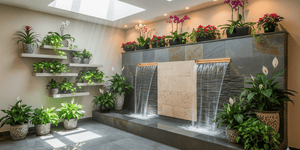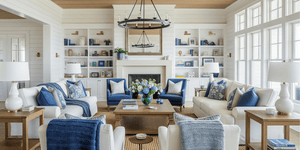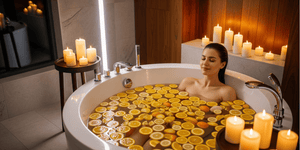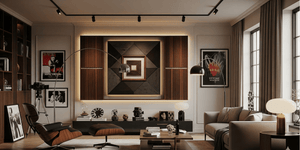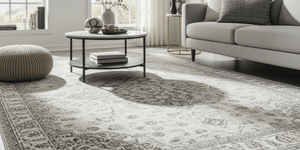Making Your Home a Kid-Friendly Place
A kid-friendly home is a space where both resident and visiting children can safely play. In fact, intuitive child-friendly design makes it possible for children to feel welcome in every room, taking on an important role in family activities and social time in addition to a dedicated play-space. There are all sorts of ways to make your home child-friendly, whether you are a parent, grandparent, or someone who enjoys when your loved ones bring their children over to visit.
If you're considering a renovation or just a redecoration, you have the perfect opportunity to create a more kid-friendly home in little ways that will make a big difference to the children. Here at Fossil Blu, we love innovative design for the whole family, and have some wonderful child-safe and play-ready ideas for your next wave of home updates.
Use Rugs to Create a Play Area in Every Room
Children like to be near the action, but they don't always sit still easily or occupy full-sized chairs. One of the best ways to make your home kid-friendly is to add a soft rug to each room's décor, especially the living room. A rug that is comfy to sit on will encourage children to sit and play near the family conversation and feel like a part of the group.
Rugs are great for dedicated play space and for shared social space where children will spend time. They can become the foundation for block castles, doll adventures, or a comfy place to lay and color on a piece of protective cardboard.
Place Cushions On the Floor for Social Children
For children of the age where they like to "hang out", add extra large cushions, beanbags, and sturdy ottomans. You may have noticed that kids love to sprawl out on chair-like objects closer to the floor, even into their teens. You can subtly welcome this friendly, social behavior for one child or groups of children simply by adding a few extra throw pillows and padded footstools to your home décor.
A low-set coffee table is also a great place for social homework in the same environment.
Create Rounded Corners with Decorative Molding
If there are frequently little ones in your space, round the corners. Add rounded molding to the edges of walls, windows, and doorways. Choose tabletops and countertops with a rounded edge and soft corners. Make sure your couches and new chairs are not too sharp just in case an enthusiastic young person careens into them at any moment.
This is a small aesthetic choice that can make a big difference whenever the next slip or tumble happens in your home, and it's quite elegant besides.
Arrange Books Vertically by Reading Level on Your Shelf
If you have a tall bookshelf, arrange kid-friendly books by age level from the bottom to the top. For example, place baby and toddler books on the bottom shelf, early readers on the second shelf, elementary-aged novels on the third shelf, and young adult books on the fourth shelf. You will more comfortably reach your adult books on higher shelves, and teenagers are old enough to ask what's good and understand grown-up books that they are now able to reach. Any of them can take a book into a reading nook and slip into their imagination.
Paint a Chalkboard Wall in a Dedicated Playroom
One of the best ways to make a playroom is to create dedicated spaces. Among the more popular playroom trends is chalkboard paint. Children can then use sidewalk chalk or chalk pens to create beautiful murals, then wipe them clean, and make new art again and again. Kids love to decorate their own space and will develop a personal style over time.
Cousins might leave each other chalk-wall messages, siblings can build a shared play environment, and little artists can unlock their potential with no consequences or even the need for paper.
Store Old Fancy Clothes in Guest Room Closet
Adults often go through cycles of updating their wardrobe, especially as styles change over the years. But instead of tossing or thrifting your old fancy clothes - put them in the playroom closet or dress-up chest. Children love to mimic adults and put together fun outfits during play. Letting children turn your old outfits into dress-up clothes for games of pretend is a great way to enjoy a little nostalgia as children unlock their imaginations.
Place Toys in the Lowest Cabinets and Shelves in the Living Room
Most adults rarely use the lowest cabinets and shelves in their home - especially in the living room. Dedicate these spaces to children's toys, games, and art supplies, instead. Children in your house will have no problem diving for their toy boxes under the coffee table, pulling the board games out from the lowest cabinet, or finding the children's books on the lowest shelves.
Even teenagers with their springy knees will be happy to get their video games from below the entertainment center where adults rarely go.


Use Baskets, Toy Chests, and Low Storage for Easy Clean Up
Make clean-up a breeze by providing all the right containers in the right places. Toy baskets, toy chests, and low-set shelves will make it easier for children to both retrieve and put away their own things. This is why Montessori shelves and low-set closet bars are popular when determining how to make a playroom or make your home more kid-friendly.
Many children are quite happy to put away their things if the process is easy and social.
Add some lamps with smart bulbs
It's a fun idea to add lamps into different areas and to incorporate smart bulbs for kids to use in their play time. The lights in the lamps could be changed to blue if the kids are playing outer space, to red if they are playing lava floor, to white if they are coloring or drawing, and to flashing multicolor if they are having a dance party. This is a great way to incorporate light into play time.
Stow a Step-Stool in the Kitchen for Little Helpers
Kid-friendly home design isn't just about play time. Most children also enjoy helping out around the house, especially in the kitchen. Reserving a space for children to help at the island or peninsula bar is common, but It's always smart to keep a step-stool somewhere children can easily access in the kitchen so they can step up to the countertop or sink when it's time to help.
This way, children can help to stir, wash, and even learn more careful skills like chopping and cooking at the stove without having to reach up to use the countertop.
Add a Few Games to Your Smart Home Skills
Lastly, consider adding a few kid-friendly skills to your smart home. There are tons of games, joke reels, and storytelling features that you can explore and children in your house might enjoy. This is an easy task that takes a few minutes and can make family activities more fun while interacting with the smart home.
Create a Child-Friendly Home
Creating a home that is welcoming for children involves looking at the big picture, not just play but also social time, shared chores, and clean up. The right lighting is an important part of every space. Whether it is bright task light, or whimsical lamp light, we have the right lights for you. Contact us today for ideas on how to make your space stylish and kid approved.


